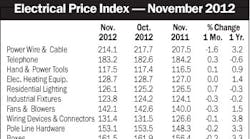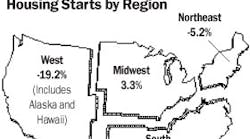Latest from Mag
The economy is beginning to show signs of life in most parts of the country and across most industries, according to the Federal Reserve Board. The indicators noted this week in the Fed’s “Beige Book” assessment of economic conditions throughout the United States in July and August showed conditions stabilizing and in some cases beginning to improve.
Although the majority of Fed districts reported flat retail sales, most regions reported some improvement in residential real estate markets. Downward pressure on home prices continued in most districts, although Dallas and New York noted that local prices were firming. Construction remained at low levels overall, but Chicago and Dallas reported a small increase in activity.
On the manufacturing side, most districts reported modest improvements. Philadelphia, Richmond, Atlanta, Cleveland and Chicago all reported slight-to-moderate increases in new orders. San Francisco indicated that new orders increased for manufacturers of semiconductors and other IT products, while orders declined for metal fabricators and petroleum refineries. Dallas noted that orders held steady, while St. Louis reported that manufacturing output continued to decline, but at a slower pace. Richmond, Atlanta, Chicago and Minneapolis reported increases or planned increases in automobile and automobile-related production. Several districts also noted increased production in the pharmaceutical industry.
The Fed banks found manufacturers to be cautiously optimistic about the near-term future across most of the country. Boston, New York and Philadelphia reported that their contacts expect modest growth later this year or early 2010. Boston noted that while its contacts generally expect modest growth, several cost control measures would remain in place. Dallas reported increased uncertainty among construction-related manufacturers, while Cleveland noted that half of their manufacturing contacts expected weak demand into 2010.
Reports on commercial real estate markets indicated that demand for space remained weak and that construction continued to decline in all districts. Atlanta, Philadelphia, Richmond and San Francisco reported that vacancy rates increased, while rates held steady in the Boston and Kansas City districts and were mixed in New York. Boston, Dallas, Kansas City, Philadelphia and Richmond commented that the demand for space remained weak.
Employment levels are widely expected to lag an economic recovery, and employers are often expected to increase hiring of temporary workers before committing to new permanent hires. Staffing firms in a majority of districts reported a modest increase in the demand for temporary workers, although industry contacts in Boston also questioned whether these gains will persist. New York cited a modest pickup in temporary hiring for the legal and financial industries. Chicago noted an uptick in demand for workers in the healthcare and information technology industries. St. Louis and Minneapolis reported that federal stimulus funds have had a positive impact on construction and local government jobs.

